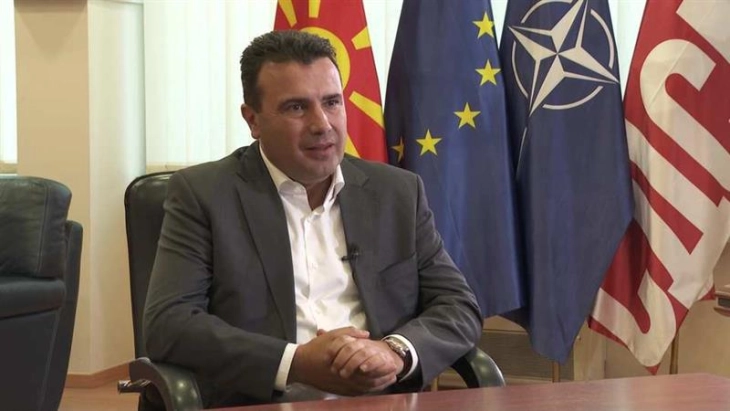Zaev: Nationalism harms societies, patriotism encourages citizens to work for the future

Skopje, 10 November 2022 (MIA) – Nationalism can benefit politicians who incite it by raising their popularity, keeping them in power and distracting the public from domestic policy, but in the end this deeply harms societies, former prime minister Zoran Zaev said in an interview for the Academic Network Supporting EU Policies Towards Western Balkans.
“Nationalism can destroy my country from within, but it can also harm North Macedonia’s relations with Greece and Bulgaria, because the provocations caused by nationalist rhetoric can give enough reasons to the Prime Ministers of Greece and Bulgaria to take up measures against us in order to protect their dignity and pride. Therefore, nationalism does not help build friendships, does not encourage connections, does not secure a prosperous future,” says Zaev.
He draws a parallel between nationalism and patriotism, stressing that unlike nationalism, patriotism encourages the citizens to work towards a better future.
“We as North Macedonia are proud of our history, but the most important thing is the future. The future is something we need to guarantee and improve. I am very afraid of nationalism, maybe because I am from the Western Balkans. I am aware of what has happened in other parts of the world because of nationalism. The policy of nationalism, once radicalized, and accompanied by populism can definitely become destructive. There are many poisons in the world, but nationalism is one of the worst ones. Those who use it to satisfy their own political interests sometimes forget to wash their hands and poison everything, spreading enmity between societies,” says Zaev.
In the interview, Zaev also speaks about the Prespa Agreement, which he reached with former Greek prime minister Alexis Tsipras, assessing that the document represents a real success, because it gave the country the opportunity to demonstrate its ability to solve foreign policy issues peacefully, through soft power.
He points out that the EU wants to avoid importing bilateral issues, which is why, by normalizing the country’s relations with Greece, a significant obstacle has been removed from its path to EU membership, while the inclusion of European values in the country can only contribute to further democratic unity of the entire continent.
“We demonstrated our strong commitment to the values of democracy, dialogue and compromise. Which is why I believe that we can only add more value to the European Union. More specifically, there is a condition which stipulates that a country’s accession cannot be completed as long as it has bilateral issues with the member states,” says Zaev.
He says that besides the numerous benefits of the Prespa Agreement, the most important thing during its creation was to protect the Macedonian identity, but also to think of a better future for the citizens, excluding the importance of the political career.
“Alexis Tsipras and I will never regret the compromises we made, because the citizens on both sides know that not only was the decades-long dispute finally solved, but also the way was paved for a strategic partnership between the two countries. The Agreement created an entire framework enabling future cooperation,” notes Zaev.
Regarding North Macedonia’s NATO membership, Zaev stresses this is incredibly important for the country, but also for the entire Western Balkans, because it is a multiethnic region, full of conflicts generated throughout history.
“Eighteen years ago my country experienced a conflict, many people died, young people, not to mention Kosovo and Serbia, Bosnia and Herzegovina, Croatia, Slovenia… We need better safety and security precisely because there are so many sensitive issues in this region. Being a NATO member does not only bring safety and security to our country, but it also positively affects the region. All these countries consist of various religious groups, and religious radicalism is still lurking. In addition to that, the Western Balkan region is made up of developing countries and there is a lot of poverty. All of these factors can easily lead to conflicts,” says Zaev.
This is why, according to the former PM, NATO means internal peace, stability, security, conditions immediately favorable to economic development, that improve our financial credibility and enable new jobs.
On whether there is Russian influence in the country, Zaev points out that Moscow’s propaganda is present in the entire region, including North Macedonia, and that Russia opposes NATO expansion and is maintaining its own political, economic and energy interests.
“The key question is where will we decide to go, who will we strengthen our cooperation with. We are a small country and it is good that we cooperate with everyone. However, Russia, China and the Middle East should know that we have made our decision, arising from our sovereign right, to be a NATO and EU member. Why? Because this will bring a better life. We hope they will be able to accept this fully, and this will give us the opportunity to cooperate with everyone, of course, without endangering our NATO and EU membership,” underlines Zaev. ad/ik/







